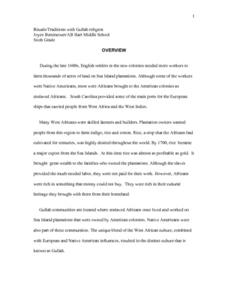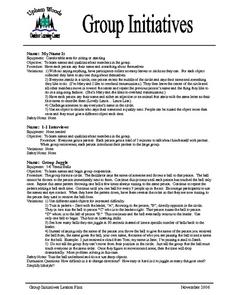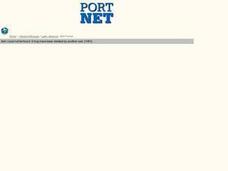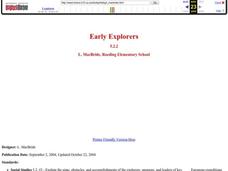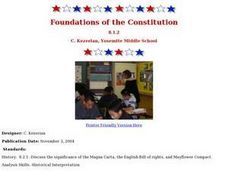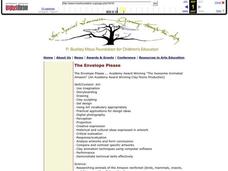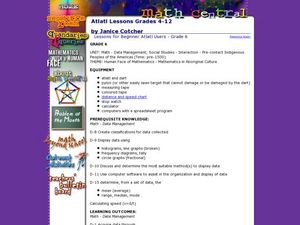Curated OER
Blasphemy: Salman Rushdie
Students discover the definition of blasphemy and examine examples of it in history. In this blasphemy lesson, students listen to their instructor present a lecture regarding details of blasphemy throughout history. Students respond to...
Curated OER
Three Little Pigs: Human, Natural and Capital Resources
First and second graders will learn about natural, capital , and human resources through the story The Three Little Pigs. They will listen to the story, write down what they know about straw, wood, and brick, then complete a chart...
Curated OER
Rituals/traditions with Gullah religion
Sixth graders discuss some of the earliest people who lived in each region in order to comprehend how humans interacted with the environmental conditions at that time. They make connections to present-day regions including...
Curated OER
A Monument Please, For the Big Cheese
Young scholars research a President from the United States. In this United States history lesson, students read about their selected President and record interesting facts. Young scholars design a monument for the President they researched.
Curated OER
Government and Community Resources
Adult learners, with the assistance of flash/picture cards, explore a variety of United States holidays and social customs: Labor Day, Halloween, Thanksgiving, Hanukkah, Christmas, and more. In addition, they draw pictures illustrating...
Curated OER
Power Builders: Leaders and Cities
Students are explained that they are going to consider why cities are built and what needs they meet for their residents. They view a video "The Building of New York City." Students work in small groups to plan imaginary city. They...
Curated OER
Positive Tolerance
Students engage in a lesson that focuses on the principal of tolerance. They are given examples of what a school should be like. The goal of the lesson is to get the students to treat others fairly even if differences exist.
Curated OER
The 36th President: Lyndon B. Johnson, US History
Students research and analyze Lyndon B. Johnson's achievements as the 36th President focusing on his legislative program. They consider how the passage of time can influence a President's reputation.
Curated OER
Roles, Rights, and Responsibilities of Community Members
Students identify the roles, rights and responsibilities of a specific community. They conduct research, brainstorm ideas and prepare an illustrated booklet to present the gathered information.
Curated OER
Navigation
Students explain that globes are the best way to show positions of places, but flat maps are portable and can show great detail. They make a mercator projection of the route Lewis and Clark took on their journey.
Curated OER
Probability and Spinning the Dreidel
Seventh graders study the term probability. In this Math lesson, 7th graders practice their probability skills by spinning a dreidel. Students complete a worksheet on probability.
Curated OER
100 Remarkable People
Middle schoolers investigate a variety of important historical figures in order to present a report to the class. The use of internet research skills is reinforced for the beginning of the lesson and culminates in an oral presentation of...
Curated OER
Group Initiatives
Learners explore the names and qualities about members in the group. They each say their name and something about themselves. Students gather around in a circle. They listen to the teacher as he or she says the name of someone and throws...
Curated OER
Courage
Students review the definition and the need for courage. As a class, they brainstorm a list of ways one can be couragous at different ages. In groups, they apply courage to the four facets of life and share their responses with the...
Curated OER
Active Citizenship and The New Britons
Students determine some rights that citizens have and then list some responsibilities. They try to list the 5 most important rights and the 5 most important responsibilities. They try explain why they think this.
Curated OER
Effects of The Great Depression
Seventh graders discuss the unemployment trends of the 1920s-1930's. They look at it faces of the citizens that lived in the time period. Students work with visual clues to investigate about the living conditions during the Great...
Curated OER
Develop Global Perspectives of Nations and Peoples of the World
Young scholars analyze examples of the world socio-economic trends. Using those examples, they develop their own global persective of the different nations and peoples of the world. They determine the value of cultural diversity and...
Curated OER
People Of The Plains
Young scholars engage in a lesson that discusses how Native Americans lived in all different parts of North America. They focus on investigating the region's natural resources and how the indians used them to build shelter, make...
Curated OER
Latin American Relief Map
Students, in groups, research, design and construct a relief map of a section of Latin America using papier-mache. They show major landforms, elevations and notable bodies of water. They present their maps to the class.
Curated OER
What Animals Live in the Rice Paddy?
Students listen to a story about turtles leaving a rice field to go to sea. In this literacy and social science lesson, students discuss the story, write a sentence describing each turtle, and draw a picture of the turtle's home in the...
Curated OER
Early Explorers
Fifth graders explain the reasons why Europeans decided to explore and colonize the world. In this European explorers lesson, 5th graders complete a wall matrix about the explorers and write a summary about the explorer of their choice.
Curated OER
Foundations of the Constitution
Eighth graders explore the Magna Carta and the Mayflower Compact.
Curated OER
The Envelope Please
Students research an animal of the rainforest. They create a computerized claymation to present their research.
Curated OER
Atlatl Lessons Grades 4-12: Lesson for Beginning Users of Atlatl
Sixth graders determine the mean, range median and mode of a set of numbers and display them. In this data lesson students form a set of data and use computer spreadsheet to display the information. They extend of the process by looking...




